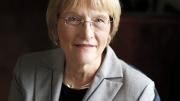I will always remember my first library card, acquired during a childhood summer in a little town on Cape Cod. I would ride my bicycle to the local library, housed in a converted Victorian house that was always dark, cool and musty inside. There I experienced the thrill of independence and—owing to the ten book borrowing maximum—the agony of choice. I spent hours considering and reconsidering my options. Between visits, I read voraciously: wild adventures and exotic locales, new ideas and far-off places, and—my favorites—noble animals and brave girls. Though my interests have expanded and changed a bit over the years, my love of books and libraries, so vivid in my memories of that summer in the 1950s, has never faded. For me, the bicycle and the books meant a first taste of freedom.
In the decades since, I have come to appreciate that there is a special fellowship shared by scholars and other avid readers. As Harvard alumnus Henry Cabot Lodge put it, “…the true lovers of books are a goodly company one and all.” With those words, he welcomed a throng of well-wishers to the dedication of the Harry Elkins Widener Memorial Library at Commencement in 1915, nearly a century ago. Eleanor Elkins Widener, who had given her beloved son’s remarkable collection of books, manuscripts, and drawings to the University after he perished aboard the Titanic, funded the construction and was on hand to see her vision realized. As crowds looked on from the parapets and stairs, she presented a key to my predecessor A. Lawrence Lowell and gave Harvard one of its iconic and beloved spaces.
When it was completed, Widener held 600,000 volumes. Today, as we prepare to celebrate its 100th birthday, it holds 3.5 million volumes in ten stories of stacks and opens its doors—and turnstiles—to more than half a million people each year. Imagine the thrill that scholars and other visitors must experience as they ascend the steps (famously featured in the film Love Story) and enter for the first time, the latest in an endless stream of knowledge seekers that has flowed through the heart of Harvard’s library system for almost 100 years. It is a place of knowledge and of memory. You can almost see John Singer Sargent stepping back to admire his completed murals or Barbara Tuchman settling into her carrel surrounded by British history to draft her undergraduate thesis. Nearby, a young Norman Mailer searched for D.H. Lawrence’s Lady Chatterley’s Lover, and Margaret Atwood scanned the offerings in Canadian literature before moving on to witchcraft and demonology. My own scholarship has benefited from Widener’s rich collections in my field—including materials brought back from the South by Harvard alumni at the end of the Civil War—seemingly awaiting me and my 21st century questions.
The promise of such encounters attracts many faculty to Harvard and its libraries, and they are in turn ensuring that the next generation of scholars appreciates and benefits from our exceptional holdings. Last year, some 700 students attended more than 70 class sessions held in Widener. Under the guidance of librarians, curators, and bibliographers, they deepened their understanding of research methods, learned to navigate the ever-shifting landscape of information, and gained hands-on experience with objects including newspapers, diaries, journals, maps, and manuscripts. These experiences offer students a unique window on the world of ideas and challenge them to situate their own interests and work in the broadest possible context.
Today the quiet solitude of the stacks is complemented by new, digitally enabled means of accessing collections and lively exchanges in innovative spaces. Librarians are helping faculty discover and deploy letters penned by Lord Byron, ornamental maps of 19th century Japan, the papers of the Beecher-Stowe family, miniature books by Charlotte and Branwell Brontë—and are facilitating online access to these collections to learners across the globe. Libraries are home to a goodly company that grows greater by the day—happy 100th birthday, Widener.
Sincerely,
Drew Faust









